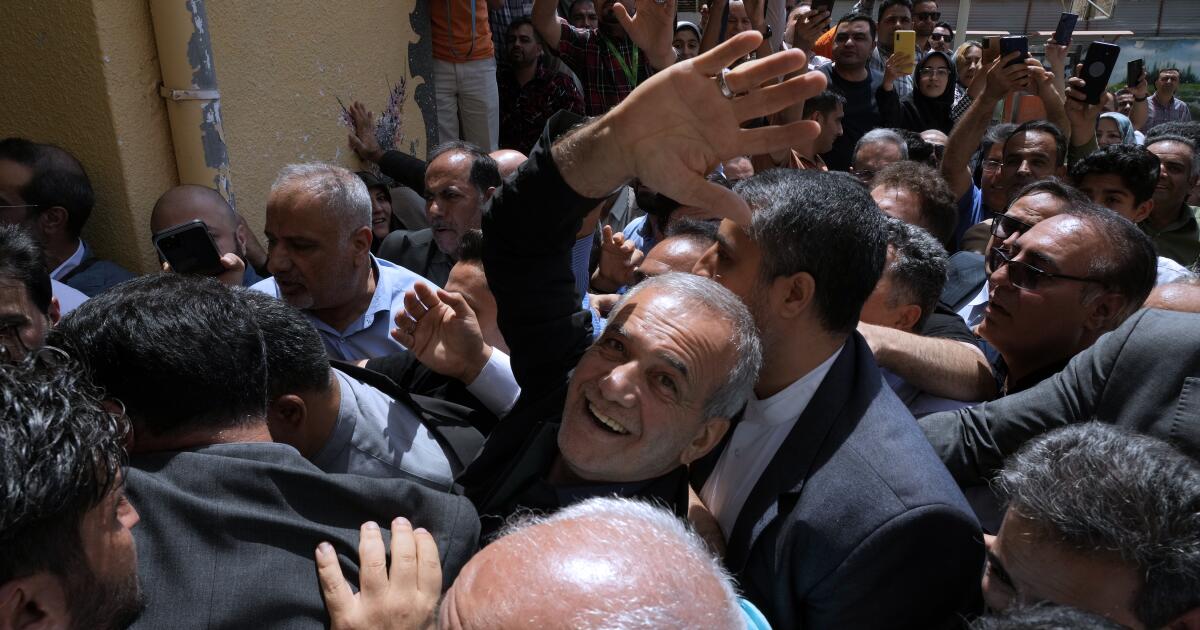Dubai —
Iran held a presidential runoff election on Friday pitting a hardline former nuclear negotiator against a reformist lawmaker, but both candidates struggled to convince a skeptical public in the first round, resulting in the country’s lowest voter turnout in history.
Supreme Leader Ali Khamenei and other government officials predicted turnout would increase as voting proceeded, and state television showed footage of modest lines at polling stations. But online videos showed some polling stations empty, and a survey of dozens in the capital, Tehran, showed light traffic amid heavy security on the streets.
Khamenei has insisted that low turnout in the first round of voting on June 28 does not represent a referendum on Iran’s Shiite theocracy. But many remain disillusioned in a country wracked by years of harsh economic sanctions, a bloody crackdown by security forces on mass protests and tensions with the West over progress in Iran’s nuclear program that has brought it closer than ever to enriching uranium to weapons-grade levels.
“It is unfair that Iranian women are beaten and humiliated in the streets by extremists who want to destroy the country by cutting ties with big powers, so I want to save the country from the isolation we are in and from the lies and violence against women,” voter Ghazal Bakhtiari said. “We should have ties with America and big powers.”
The race pits former negotiator Saeed Djalili against reformist Massoud Pezeshkian. Djalili is known among Western diplomats as a stickler during talks over Iran’s nuclear program and has sparked concern at home over his hardline views on Iran’s hijab mandate. Pezeshkian, a heart surgeon who campaigns for loosening the hijab and liaising with the West, has also supported Khamenei and Iran’s paramilitary Revolutionary Guard for decades.
Pezeshkian’s supporters have warned that Jalili would set up a “Taliban”-style government, while Jalili has accused him of waging a campaign of fear.
Both candidates voted on Friday in Tehran’s poor southern district. Pezeshkian came out on top in the first round of voting on June 28, while Jalili has been trying to secure votes from supporters of hardline Parliament Speaker Mohammad Bagher Qalibaf, who came in third and later supported Jalili, a former negotiator.
Pezeshkian declined to comment after the vote, leaving the room with former Foreign Minister Mohammad Javad Zarif, who forged Iran’s 2015 nuclear deal with the world. (Iran resumed its nuclear program in 2019 after the Trump administration abandoned the deal.) A raucous crowd surrounded Pezeshkian and Zarif, chanting, “The hope of the people has come!”
Jalili voted at a different polling station and was surrounded by a crowd shouting, “Mr. Raisi, your way will continue!” The two men are hoping to replace the late President Ebrahim Raisi, 63, who was killed in a helicopter crash on May 19 that also killed the country’s foreign minister and others.
“Today, the whole world recognizes that it is the people who decide who will be their president for the next four years,” Jalili said after the news conference. “It is your right to decide which person, on what path and with what approach should govern your country for the next four years.”
But as has been the case since the 1979 Islamic Revolution, women and those seeking more radical reforms will be barred from voting, and the vote itself will not be monitored by internationally recognized observers. The country’s Interior Ministry, which also oversees the police, will oversee the results.
Calls for a boycott came from sources including imprisoned Nobel Peace Prize winner Narges Mohammadi, but in the absence of a widely recognised opposition movement active inside or outside Iran, Iranian voters appeared to decide last week not to take part themselves.
Voter Yagoub Mohammadi, 27, said he voted for Jalili both times.
“He is clean and not dependent on those in power within the system,” Mohammadi said. “He represents those who do not have access to power.”
The vote comes amid rising tensions across the Middle East over the war between Israel and Hamas in the Gaza Strip. In April, Iran launched its first direct attack on Israel over the Gaza conflict, while militias in the region that Iran supplies weapons to, such as Lebanon’s Hezbollah and Yemen’s Houthi rebels, have joined the fighting and intensified their attacks.
Iran continues to enrich uranium to near weapons-grade levels and has stockpiled enough uranium to build multiple nuclear weapons, and while Khamenei remains the country’s final decision maker, Iran’s foreign policy is likely to tilt toward either confrontation or cooperation with the West regardless of who wins the presidential election.
More than 61 million Iranians aged 18 and over are eligible to vote, of which 18 million are between 18 and 30. The election is due to end at 6 pm local time but is traditionally extended until midnight to increase voter turnout. Authorities have already announced one extension.
The late Raisi, 63, was a protégé of Khamenei and was seen as a possible successor to the supreme leader, but is known to many for his role in Iran’s mass executions in 1988 and in the bloody crackdown on dissent following protests over the death of Mahsa Amini, a young woman who was detained by police for allegedly improperly wearing the hijab, a headscarf that will become mandatory in 2022.
Gambrell reported from Dubai and Karimi from Tehran.

